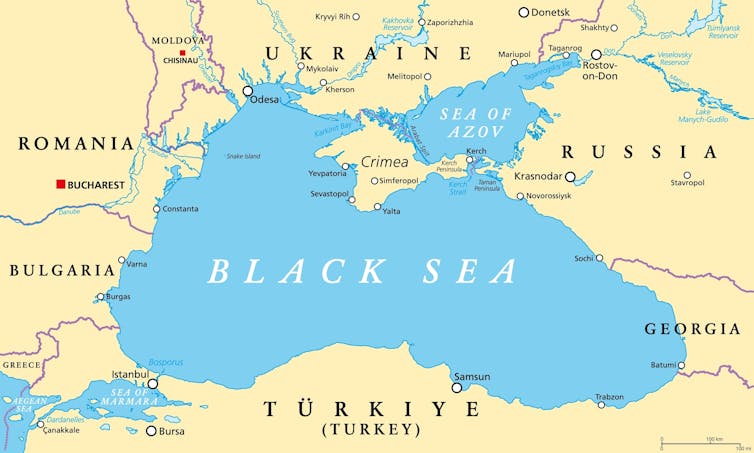A maritime ceasefire deal to allow the safe passage of ships and end the use of force in the Black Sea could soon come into effect. Brokered over the past two weeks by the United States and agreed to by both Russia and Ukraine, it has immediately raised concerns that it could mainly benefit Russia.
Indeed, at first sight, since Ukraine has had the upper hand in the Black Sea for the past two years, the ceasefire seems to not only benefit Russia but also undermine Ukraine’s strategic advantage at sea.
But a more careful assessment of the naval situation in the Black Sea, balanced against possible diplomatic gains, reveals a more nuanced picture.
Benefits for Russia
There are obvious benefits for Russia. First and foremost, the ceasefire deal will improve Moscow’s access to the global grain and fertiliser market and possibly soften western sanctions on payment systems and access to ports to enable that.
In addition to the expected economic benefits, the deal would also enable the Kremlin’s propaganda machine to claim that Russia cares – as Russia’s foreign minister Sergei Lavrov insisted – “about the food security situation in Africa and other countries of the global south”.
In military terms, Black Sea fleet commanders will be happy to know that the remainder of their naval assets might be safe at last. The deal is also likely to prevent Ukraine from any attempt to destroy the strategically and symbolically important Kerch bridge linking occupied Crimea with Russia.
Concessions by Russia
Russia has almost nothing to lose operationally, since its remaining surface warships could not operate safely in the northwestern Black Sea and were thus stuck most of the time in ports as far away from Ukraine as possible.
One concession may be that Russia pauses any submarine-launched cruise missile attacks on Ukraine. But this activity has been limited of late. So, with the clear economic and diplomatic benefits this deal represents in return for very limited military concessions, Russia appears as the logical winner of this deal – at least at first sight.
Benefits for Ukraine
Ukraine will certainly also benefit from cheaper and safer access to the global markets (insurance premiums are expected to fall considerably, for a start). And Kyiv will be able to use the time bought by the ceasefire to procure more drones and missiles that might be used later if naval operations against the Russian Black Sea fleet eventually resume.
At the same time, the Russian navy cannot be reinforced as long as the Turkish Straits remain closed to warships under the Montreux Convention. Ukraine’s upper hand in the Black Sea is a result of its efficient use of asymmetrical weapons, such as drones and missiles, that can be stockpiled. But Russia’s Black Sea fleet remains depleted and vulnerable because it has been unable to repair or replace any of its warships, due mainly to the closure of the Turkish Straits passage mentioned above.
Read more: What the Montreux Convention is, and what it means for the Ukraine war
On the diplomatic front, this ceasefire enables Kyiv to show that they have made major concessions. This is a show of goodwill, and a clever way to appease the US president, Donald Trump, for whom the importance of being able to announce he has made progress towards an overall ceasefire is central. And all these benefits can be obtained at a limited cost.
Concessions by Ukraine
Ukraine will not lose key operational or strategic options as a result of the deal, since at the moment there is only a limited war going on at sea – given that Russia has largely been forced out and has moved its fleet east from Sevastopol to ports on the Russian mainland. In fact, Ukraine had already achieved almost everything realistically possible in the Black Sea. The ceasefire does not now cancel these achievements, since Russia is also prevented from attacking Ukraine from the sea.

Overall, the fact that this initial step toward a lasting peace agreement has been achieved at sea is testament to Ukraine’s upper hand in the maritime domain as well as the efficiency of western sanctions in cutting Russia off from the global maritime supply chain.
Moscow is the winner but Kyiv is not a loser
Based on the above assessment of the benefits and concessions in light of the naval situation in the Black Sea, both Russia and Ukraine benefit from the ceasefire – although this is indeed less obvious in the case of Ukraine.
Kyiv can consider it a success because Ukraine has nothing substantial to pay or lose. In contrast it gets the ball rolling towards a bigger deal and – most importantly – it keeps the Trump administration onside. Putin can also assess himself to have won because of the direct economic and diplomatic gains Russia gets from the deal.
It’s probably correct to say that Russia has gained more than Ukraine from this agreement – but the reality is more nuanced. The ball is now in Russia’s camp. If it violates any condition of the deal (and the level of trust in Moscow’s goodwill remains low), it will discredit the Kremlin’s diplomacy and anger Trump. And neither side wants to do that right now.
Basil Germond does not work for, consult, own shares in or receive funding from any company or organisation that would benefit from this article, and has disclosed no relevant affiliations beyond their academic appointment.
This article was originally published on The Conversation. Read the original article.







